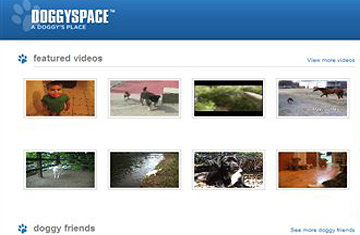
Doggyspace.com's homepage
Along with detailing his age and weight, Monty's profile proclaims his love for the beach and taking walks. Another profile, belonging to Marley Sue, gushes, "I will occasionally give you love bites on your feet and toes especially if you're wearing socks!" A third profile — Fletcher's — is more philosophical: "Life is too short to behave for too long."
No, this isn't some new online dating site. This is Doggyspace.com, a social-networking site for dogs. Launched in July, the site already has nearly 700,000 users and is the newest pup in a growing litter of online communities for pets. Members (or presumably their two-legged companions) create profiles — including photos, videos and blogs — and befriend other like-minded animals; soon they will also be able to form groups and forums. "Owners take a backseat," says Doggyspace founder and CEO Levi Thornton. "It's all about the dog."
Online networks targeting pet lovers are common, but a growing subset is catering to the pets themselves, including MyCatSpace.com, Dogbook.com (part of Facebook) and Petster.com (remember Friendster?). Pets write messages to one another about shared interests and offer advice on health problems, training or local dog-friendly parks. Some have even enlisted their caretakers to arrange offline play dates. "Animals are natural social-networking beasts," says Noah Paessel, CEO of SNIF Labs, a tech firm started by a group of MIT Media Lab graduate students to study "social networking in fur."
Kathryn Galbraith, 24, created a Doggyspace profile to get the word out about her pit bull–lab mix, Joe. "Writing from his perspective lets other people know how great of a dog he is," says the marketing project manager in Frederick, Md. Galbraith notes that it took her four years to make 158 friends on MySpace, while Joe has racked up 85 friends in just one month on Doggyspace. "My dog is more popular than I am," she says.
The site is also a hit among people who find traditional forms of social networking too invasive. "It's nonthreatening," says Dale Miller, 55, who does not use Facebook or MySpace but who updates a Doggyspace page daily for her bulldog mix, Etta. "It's for you, not necessarily about you."
The site relies heavily on role-play, as owners imagine what Spot might be thinking when "Mommy" has a late night at work or expound the virtues of a new chew toy. Which means that at its core, sites like Doggyspace may not be all that different from traditional social networking. In the end, says Thornton, even when people are barking on behalf of their pets, "everybody's pretty much talking about themselves."
But sites like Doggyspace could be the wave of the future. As social networking changes from a buzzword to an increasingly regular part of life, SNIF Labs' chief technology officer, Jonathan Gips, says online communities based on a common interest will become more prevalent. "There will be more niches," he says. Already Doggyspace is starting to attract non-canine species: a white rabbit named Nixie writes on her profile, "I am a bunny, but I joined this because there is no BunnySpace." Yet.
